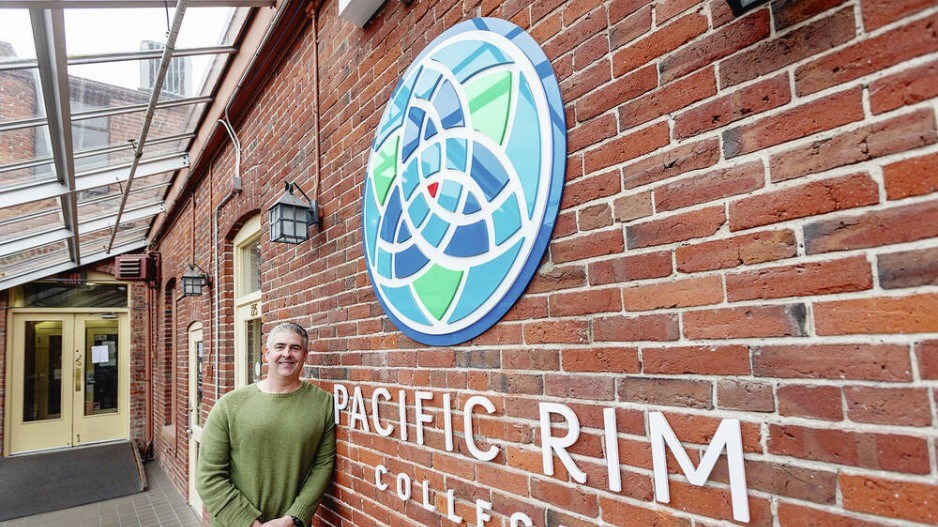The president of a college in Victoria says he supports a provincial crackdown on private post-secondary institutions “preying” on international students, but worries about the impact of further restrictions on legitimate operations.
James Christian says Pacific Rim College in Market Square, which has 360 full- and part-time students taking courses in alternative healing, meets the highest provincial standards, doesn’t charge higher fees to its international students — who make up about 10 per cent of school population — is accredited and student-aid approved, turns out skilled workers and performs community outreach.
Christian said the reputations of all private post-secondary institutions are affected by unscrupulous players.
“I’m aware of the so-called bad actors, a lot of colleges that operate like diploma mills where they bring in large quantities of international students, the level of education that they provide isn’t as high or doesn’t meet the standard, and there’s no sort of career path for the students after that,” he said.
“It makes it problematic for us, the colleges that do jump through all the hoops, pass all the regulatory framework requirements, and go above and beyond,” said Christian. “It feels like it paints every post-secondary private institution with the same brush, that they are not doing a good job or breaking the rules.”
Christian said Pacific Rim College, which has been in operation for 16 years, offers some four-month certificate programs in the $4,000 range, with the majority of students in three-year diploma programs of about $9,000 a year. The college trains herbalists, holistic nutritionists, traditional Chinese medicine practitioners and doulas.
Post-Secondary Education Minister Selina Robinson announced Monday that more stringent measures are coming to rein in so-called diploma mills taking advantage of international students with higher and hidden fees and not delivering the quality of education promised.
There will be more frequent inspections, higher standards, demands for greater transparency in tuition fees, a requirement for proof of labour-market demand for any new programs, and proof of appropriate resources and supports for students, said Robinson. She cited private institutions with classroom space for 50 students accepting 800, forcing the rest to learn online.
There will also be a two-year freeze on any new private post-secondary institutions that want to receive international students. Two on the Island have applied.
Christian said he agrees that changes are needed to remove poor-quality schools, “but I feel like we are wrongly being included in that group,” and potential students might not know that schools like Pacific Rim are passing already rigorous screenings, annual audits and student-attendance tracking.
The federal government has announced a two-year cap on international students — a 35 per cent reduction in new undergraduate study visas granted this year.
The cap, said Christian, wouldn’t be a “dramatic drop” for the school, which has only about 36 international students, but “any reduction is going to be hard for us to handle” because operational costs remain high.
The government is proposing a target of about 83,000 study permit applications in 2024, which could result in 50,000 study permits being issued based on current approval rates.
That’s in addition to those international students exempted from the allocation, such as K-12 schools, and international students studying at the master’s or doctoral levels.
B.C. is in discussions with the federal government on additional exemptions for priority sectors, such as health care.
Robinson said the province will take the new federal rules into account as it works with public and private institutions to set appropriate limits on international enrolment.
“Until we have more data from Canada, no decisions will be made about how the province will allocate visas,” said the Post-Secondary Education Ministry.
There are 324 private training colleges in the province — including 49 institutions at 69 locations on Vancouver Island — of which 215 have an Education Quality Assurance designation, meaning they can accept international students. The majority are in the Lower Mainland.
The names of those that have received compliance orders or administrative penalties are posted on the Private Training Institutions Branch’s website.
B.C. has the second-highest number of international students in the country after Ontario, so the cap could reduce international students in the province by as much as 50 per cent.
It will affect both private and public colleges and universities, including the University of Victoria and CamosunCollege.
“We’ll be working with our public institutions about what we expect to see in terms of numbers of international students relative to domestic students, so that everyone has a really good educational opportunity,” said Robinson.
A Statistics Canada report shows international undergraduate students pay an average of $36,123 per year in tuition, compared with $6,834 for Canadian undergrads. At UVic, a basic undergrad degree is about $6,000 a year compared with $30,000 a year for an international student.
About 16,000 undergraduate students are enrolled at UVic, of which about 11 per cent are international students.
Premier David Eby said he’s pushing for the reductions to be done in a way that minimizes harm to the provincial economy, post-secondary institutions and international students, and “maximizes the benefits of why we’ve always supported a strong international student program in British Columbia.”
Victor Tesan, president of Sprott Shaw College, said the college has a vested interest in Canada maintaining its reputation for excellence in delivering education, and “fully supports the aim to provide stability and security to the international student program in Canada.”
The vast majority of its students are domestic, he said, noting the college offers training for much-needed careers such as licensed practical nurses, health care assistants, early childhood educators and skilled trades.
B.C. has about 175,000 international post-secondary students, including 82,000 at public colleges and universities and 94,000 at private institutions.
>>> To comment on this article, write a letter to the editor: [email protected]




